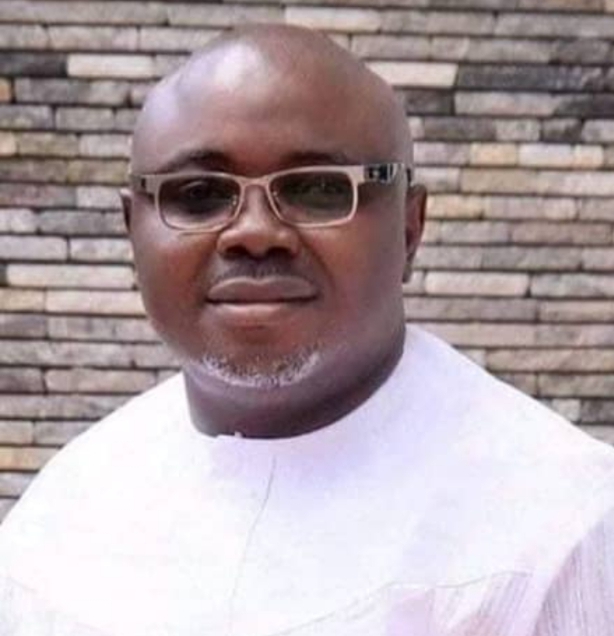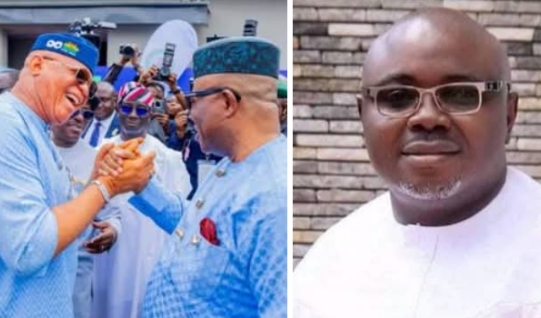…speaks on significance of Gov Umo Eno’s defection, 2027 election
Abom Barrister Ephraim Okon, PhD, KSJI, is a Special Assistant to the Governor of Akwa Ibom State on Grassroots Mobilisation.
In this exclusive interview with UKO CALLISTUS, Dr Okon delves into the recent court ruling vindicating Senate President Godswill Akpabio, the implications for rule-based leadership in Nigeria, the evolution of digital accountability, and the fast-changing political terrain ahead of 2027—including the monumental defection of Governor Umo Eno to the APC.
EXCERPTS:
How crucial is the court’s ruling affirming Senate President Akpabio’s authority amid rising populist defiance?
The ruling is profoundly crucial—especially for us here in Akwa Ibom—because it directly involves our former Governor, now Senate President, Godswill Akpabio. As someone serving as Special Assistant to the Governor on Grassroots Mobilisation, the court’s judgement sends a powerful message all the way down to the unit and ward levels: that order and rule adherence must be upheld, even at the apex of governance.
The court struck a balance—recognising the Senate’s disciplinary powers while calling the suspension duration “overreaching.” This affirms the Senate President’s responsibility to maintain decorum and enforce Standing Rules. It’s a lesson to grassroots actors that while democracy permits dissent, it must be practised within structured boundaries. That’s how we avoid chaos and build institutional respect from the ground up.
With satire clearly separated from contempt in court, has Akpabio’s leadership now been vindicated against political attacks?
Absolutely. From our vantage point, where Akpabio’s political trajectory is closely observed, the ruling against Senator Natasha Akpoti-Uduaghan was a strong vindication. Her “satirical apology,” found to be in contempt of court, was rightly sanctioned with a ₦5 million fine. In an age where misinformation and satire often distort political narratives—especially online—this judgement draws a bold legal line.
It shows that there are consequences for trying to ridicule or undermine a sitting Senate President or court order, even under the guise of satire. This builds public confidence in legislative authority and helps us educate grassroots participants on responsible expression, both offline and online.
The court says Akpabio acted by Senate Rules, not vendetta. What does this say about rule-based leadership in Nigeria?
It’s a strong affirmation that Nigeria must be led by rules, not whims. The court clarified that Senate President Akpabio acted according to Senate Rules, not personal grievances. That’s not just a win for him—it’s a win for democracy.
At the grassroots, where we often battle perceptions of favouritism and arbitrariness, this verdict is a useful example. It reinforces that legal checks are in place, even for the highest office holders. It strengthens public trust, promotes transparency, and deters abuse of power. These are values we preach daily—whether in town hall meetings, community forums, or political sensitisation drives.
By insisting only lawfully seated senators can speak, how does the ruling reflect Akpabio’s commitment to institutional order?
It reflects a very high commitment to order. As a lawyer myself, and as someone engaged in political mobilisation, I see this insistence as a sign of legislative discipline.
Parliamentary dignity matters. If everyone speaks from wherever they wish, you have chaos, not democracy. The Senate is a serious institution, and Akpabio’s insistence on protocol reinforces respect for structure—something we teach our supporters. Whether it’s in the Senate or at a ward meeting, rules matter.
Does the ₦5 million fine for online contempt set a new standard for public conduct?
Without question. While the court issued the fine, Akpabio’s decision to pursue the contempt charge underscores his intolerance for disrespect towards institutions.
In our digital age, where online commentary can quickly spiral into defamation or misrepresentation, this ruling serves as a wake-up call. It says free speech is not absolute—especially when it crosses into judicial interference or institutional mockery. The grassroots are listening, and this helps us preach responsible online engagement. It’s a necessary shift towards maturity in public discourse.
Away from Natasha-gate, with ADC, PDP, and others forming a coalition, should Tinubu and the APC be worried about 2027?
Yes, they should be concerned—but not necessarily panicked. The All Democratic Alliance (ADA), which has evolved into the ADC, unites powerful figures like Atiku Abubakar, Peter Obi, Nasir El-Rufai, David Mark, Rotimi Amaechi and others. These aren’t just names—they represent deep regional and ideological capital.
In 2023, opposition votes were fragmented. A united ADC could consolidate those votes and tap into widespread dissatisfaction. That’s a major threat to APC dominance—unless the party responds with real solutions to economic hardship and insecurity. The situation is fluid, and we in Akwa Ibom are monitoring it closely.
What must the APC do to counter alliances feeding off voter frustration and regional sentiment?
The APC must act swiftly and sincerely. First, governance must become visible—roads, jobs, security, inflation control. If we claim to align with the centre for development, it must show.
Second, party cohesion is critical. Old and new APC members, including those who followed Governor Umo Eno into the party, must feel genuinely integrated and valued.
Third, engage the grassroots directly. This is where people feel the pinch of policies. Leaders must go beyond media statements and interact face-to-face with communities, chiefs, youth, and women’s groups.
Finally, we must be proactive in mobilisation and education—countering misinformation, breaking down government programmes in relatable terms, and channelling grassroots feedback to policymakers. This is where my team plays a pivotal role.
With Umo Eno’s defection to the APC, how might this shift the political balance in the South-South ahead of 2027?
From my vantage point, it’s a monumental shift. This isn’t just another defection—it’s what I call a “tsunami of defections.” Governor Umo Eno’s move, alongside Governor Sheriff Oborevwori and former Governor Ifeanyi Okowa, is changing the region’s political DNA.
Historically, the South-South has been a PDP fortress. That’s changing. Akwa Ibom and Delta were major PDP anchors, and losing them is a severe blow. The APC now has significant control in the region—Cross River, Edo, Delta, and now Akwa Ibom—creating unprecedented leverage.
This also creates a domino effect. Remaining PDP states like Bayelsa and Rivers are under immense pressure. The narrative of “aligning with the centre for development” is taking hold. We’re seeing mass movement at the grassroots. Thousands of PDP stalwarts are switching camps. The political terrain is not just shifting—it’s being redefined.
Our task now is to manage this transition responsibly—embrace new members, calm anxieties, and ensure everyone sees the long-term developmental gain. If well managed, this could cement the APC’s dominance in the South-South for the foreseeable future.
INTERVIEWER’S CLOSING THOUGHTS:
As Nigeria’s political landscape tilts towards 2027, actors like Dr Ephraim Okon are playing a pivotal role—not just in strategy rooms but in the villages, market squares, and polling units where elections are truly won. From defending institutional respect to ushering in a new era of regional realignment, the message is clear: the grassroots matter.



